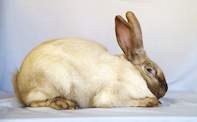In many South African households it is becoming more and more difficult to provide a family with high quality protein, an essential for growth and good health. Before a family or community can look at rabbits as a food resource, a number of things need to be in place.

Vegetable garden is required. It is essential that a vegetable garden is well established to provide fresh vegetables in excess of the family requirements the whole year round.
Constant supply of fresh water.
Housing that protects the rabbit from the weather, predators and that offers comfortable living space for each individual.
A rabbit mentor who can guide and educate to ensure success for the farmer and no risk of incorrectly handled rabbits as a result of lack of knowledge.
Why Farm Rabbits?
Advantages of farming with rabbits include the following:
Firstly, rabbits mature early and can be mated when five to eight months old, depending on the breed.They are prolific breeders, capable of bearing many kits (offspring) in a litter but more than ten is rare. They are capable of rearing between five and eight of them at a rate of four and six litters per year for between three and five years - depending on the quality and style of their management.
Secondly, rabbits need very little space compared to other meat animals, offering the highest productivity per area of all meat-yielding farm animals. They are highly efficient converters of roughage to animal protein and can produce 2.72 kg meat on the same feed and water that a cow needs to produce just 450 gm of meat. Their energy used per kg weight gain is well below that of sheep or cattle.
Rabbits do not necessarily compete for human food and can utilise fresh kitchen, garden refuse and weeds though this is not recommended as their sole diet!
Rabbit Products
Rabbits yield a range of products for consumption or for trade, all of which can have value added by further processing. Add on products range from the fur, which can be either hand tanned or collected and sent to a tannery, if of a high enough quality to offset the cost.
Pelts used in the fashion industry should be industrially tanned, but toys, rugs, slippers etc. can be hand tanned. Rabbit liver can be processed into a very high value pate. Manure can either go back into the vegetable garden or dried and packaged for resale.
The dress-out ratio is phenomenally high. Depending on breed and age at slaughter, a rabbit carcass can be between 50% and 65% of its live weight, of which between 78% and 87% is edible.
Lastly, rabbit meat is very nutritious and tasty. It has the highest digestible protein content of all farm animals. Rabbit meat has a digestible protein content of 21.8% while chicken has 20% and lamb has 15.7%. In addition, it is low in fat and cholesterol and rich in minerals, rabbit meat is especially suitable for invalid diets or sportspeople in training.
By Karoline Steenekamp